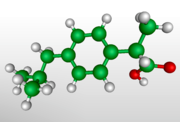Motrin
Ibuprofen is a nonsteroidal anti-inflammatory drug (NSAID) widely marketed under various trademarks including Act-3, Advil, Brufen, Motrin, Nuprin, and Nurofen; a standing joke about some athletes' regular use has produced "Vitamin I" as a slang term for it. It is used for relief of symptoms of arthritis, primary dysmenorrhoea, and fever; and as an analgesic, especially where there is an inflammatory component. Ibuprofen was developed by the research arm of Boots Group. more...
Clinical use
Low doses of ibuprofen (200 mg, and sometimes 400 mg) are available over the counter (OTC) in most countries. Ibuprofen has a dose-dependent duration of action of approximately 4–8 hours, which is longer than suggested by its short half-life. The recommended dose varies with body mass and indication. Generally, the oral dose is 200–400 mg (5–10 mg/kg in children) every 4–6 hours, up to a usual maximum daily dose of 800–1200 mg. Under medical direction, a maximum daily dose of 3200 mg may sometimes be used.
Indications
Approved clinical indications for ibuprofen include:
- Rheumatoid arthritis (DMARDs should also be considered)
- Osteoarthritis, ibuprofen can reduce pain and, if present, joint inflammation
- Juvenile rheumatoid arthritis, alone or with corticosteroids
- Morbus Bechterew (spondylitis ankylosans) together with corticosteroids
- Rheumatic fever, together with antibiotic therapy
- Acute gout attack, ibuprofen is not useful for chronic treatment
- Primary dysmenorrhoea (ibuprofen proved superior to placebo and propoxyphen, and at least as effective as aspirin)
- Fever
- Pericarditis, chiefly after myocardial infarction, to reduce pain, fever and inflammation
- Minor aches and pains such as toothache, backache, fever and pain associated with common flu, symptomatic relief of influenza, shingles, and postoperative pain
- Sporting injuries and pain after mild to moderate trauma
- Headache including mild to moderate migraine attack
Off-Label and investigational use
- As with other NSAIDs, ibuprofen may be useful in the treatment of severe orthostatic hypotension (PMID 7041104)
- In some studies, ibuprofen showed superior results compared to placebo in the prophylaxis of Alzheimer's disease, when given in low doses over a long time (PMID 16195368). Further studies are needed to confirm the results, before ibuprofen can be recommended for this indication.
- Ibuprofen has been associated with a lower risk of Parkinson's disease, and may delay or prevent Parkinson's disease. Aspirin, other NSAIDs, and acetaminophen had no effect on the risk for Parkinson's (PMID 16240369). Further research is warranted before recommending ibuprofen for this use.
Ibuprofen lysine
In Europe and Australia, ibuprofen lysine (ibuprofenlysinat, the lysine salt of ibuprofen) is licensed for treatment of the same conditions as ibuprofen. Ibuprofen lysine is said to have a more rapid onset of action compared to base ibuprofen.
Mechanism of action
Ibuprofen is an NSAID which is believed to work through inhibition of cyclooxygenase (COX); thus inhibiting prostaglandin synthesis. As with other NSAIDs, ibuprofen inhibits platelet aggregation, but is not used therapeutically for this action since it is a minor and reversible effect.
Read more at Wikipedia.org



